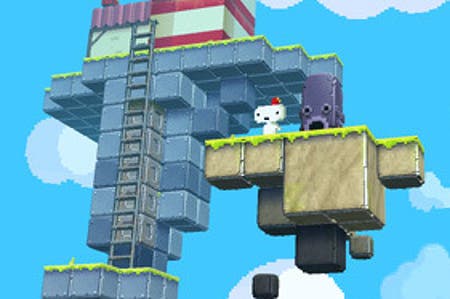Trends of 2012: Indie Games
An indie bundle of British developers predicts this year's trends.
In much the same way that the music industry struggles to define indie music, so indie games is a term that's increasingly slippery in the hands. Most would agree that an indie game is one produced without the financial backing of a publisher, but as the lines of sales and distribution blur with each passing year, so the indie label becomes less trustworthy. Your game may be wearing Converse, but does it bleed My Bloody Valentine?
Where once indie gaming propped up the mid-budget games, which in turn propped up the triple-A blockbusters, there are few rules of scale, budget and polish that can be applied in classifying indie games in 2012. Fez, due for release shortly on Xbox Live Arcade, is a sprawling pixel epic, five years in the making. Likewise, Jonathan Blow's forthcoming The Witness has been financed by the millions he made from the success of Braid, an island founded on mainstream achievement.
If you still consider indie to mean only low-budget or left-field, then you risk overlooking what could be the most creatively vibrant, exciting and ambitious area of video games this year. So what trends can we expect over the next 12 months of indie gaming?
Eurogamer spoke with a clutch of the brightest and best indie developers working today to see what those at the coal face of independent development expect will define the next 12 months, and which games we should be looking out for.
Where is indie gaming headed in the next 12 months?
Rob Fearon, creator of Squid And Let Die and War Twat (PC)
"Well, game-wise there's going to be a fair bit to play, right? That's the really important thing that's going to happen in 2012 - lots of indie devs will drop lots of games and there'll be an ample enough proportion of them that are bloody brilliant to make playing games a more pleasurable hobby to indulge in.
"Sony has been getting behind shorter but interesting, quirkier stuff across PSN which is nice and the Wii will still have too little storage and a s**t shop so everyone will continue to play Mario Galaxy 6: Mario Harder on it. So it's all good.
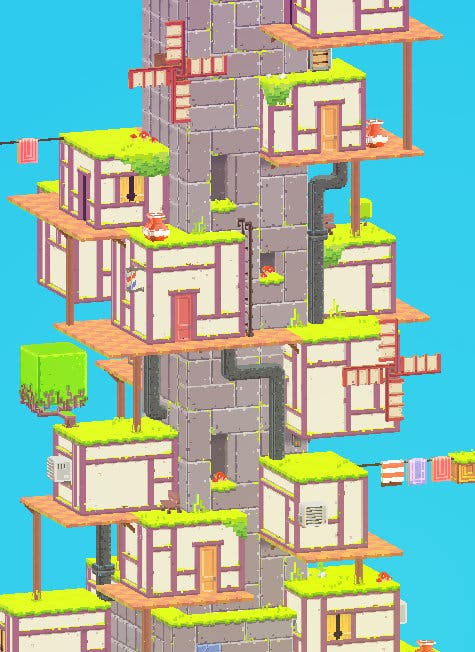
"The iThings will continue to support this mad range of stuff, if 2011 can bring Increpare games sitting alongside Minter games sitting alongside AAA-point-missware sitting alongside GTA then we know things are going pretty right there. And Android will continue to be a good starting point for hobbyists to mess around with in that 'well, we probably won't make any money but hey...' sort of way. See also Xbox Live Indie Games, if you can find it down the back of Microsoft's dashboard sofa.
"And the PC will continue being what it always has been and people will continue to deny that it's somewhere that isn't just a piracy riddled filthland and everyone else will continue shouting at those who say that because it's a stupid thing to say and every week hundreds of games will fall onto it that pretty much covers the 'there'll be something for everyone somewhere on the PC' and we can all sit back and have fun and lots of people will play good games on it and lots of people will make lots of money on it and lots of people who don't care about making money will make games on it and huzzah and yay. And Steam sales.
"In summary: video games. That's where we're heading with indie in 2012. Into video games, lots of them. I'm sure there'll be some other stuff but compared to the video games bit? No-one cares, right?"
Dan Marshall, sizefivegames, creator of The Swindle (TBC).
"I've got no idea, isn't it wonderful? You never can tell what mental s**t is suddenly going to come out of the woodwork and take the world by storm. That's what makes indie games so special; you're fed hype about AAA games for actual years in advance of it coming out to the point of saturation, whereas one day you could follow a blind Twitter link to an indie game and lose the afternoon discovering something completely new and brilliant."
Rami Ismail, Vlambeer Games, creator of Super Crate Box (PC, Mac, iOS):
"The scene will see continued big releases in the coming year - things that have taken years to create and games that will raise the bar in terms of what people expect of indie games. Games like Spelunky and Fez, like Limbo and Super Meat Boy before them, have a high potential to reach the mainstream audiences. I've a feeling the bundle bubble might burst, but I think indie games are slowly starting to seep into the expectations of what the average gamer wants from the traditional 'middle-sized' games."
Andrew Smith, Spiltmilk Studios, creator of HardLines (iOS):
"I think we'll see even more big AAA studios breaking up, or at least splintering, and out of those there'll be a torrent of new indie teams setting up. Already this year we've seen a lot of bad news just in the UK regarding traditional companies (Monumental closing, and Sony Cambridge restructuring) and as every month goes by the opportunities for making a living in indie games improve."
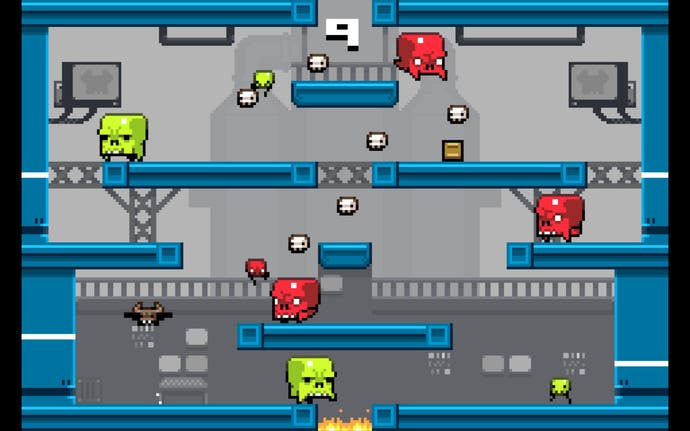
Mike Bithell, creator of Thomas Was Alone (PC/Mac)
"The most exciting thing in indie is the massive growth in quality. Games are getting better, bigger and smarter as indie devs work out the practices that best suit them, while staying true to the goals that got them making games in the first place. We're learning how to combine our powers, in a kind of Captain Planet glowing ring sort of way, with a rapidly solidifying community sharing advice, contacts and dreams of pixellated awesomeness. This is the year when indies start really telling the world who we are, and why our games matter."
Paul Taylor, Mode7 Games, creator of Frozen Synapse (Steam)
"One of the most exciting things about indie gaming is its unpredictability, so I think beyond continued growth and diversification, it's hard to make any definite calls. However, I do think the old 'what is indie' argument will be back in force, as you're going to see some pretty big-budget indie games with high production values appearing: 2012 will be the year of the "triple-i" game!"
What is the main challenge that indie game development faces in 2012?
Rob Fearon:"Finding a gun big enough to wipe all the 'piracy is killing the industry', 'all games must go free-to-play', 'micro-transactions or GTFO', 'business business business' people off the planet so we can get on with the job of making cool games and the public can get on with the job of buying and playing cool games without feeling like there's some oppressive stand-off and massive levels of distrust ever-present. Or that every developer is out to punish them, or squeeze every last penny out of them, or wants to make ever more invasive land grabs into their privacy. Or whatever.
"Or, if we can't kill them, we need to start encouraging people to remember that they are indies, they can find their own funk, their own moral safe ground and understand that anyone who tells them 'you should be doing this', 'you have to be doing this to get money here' has their own agenda and that it's OK to not listen to them. That's why you're an indie. You can make your own mistakes and successes."
Rhodri Broadbent, Dakko Dakko, creator of The 2D Adventures of Rotating Octopus Character (PSN)
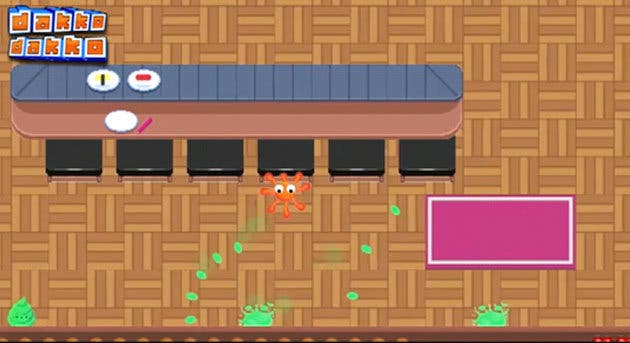
"We're still well able to keep up both technically and creatively with the big publishers, but less so in terms of marketing budgets and clout, so I think exposure will remain the biggest challenge. We need to improve our networking in general, so that 'indie' best practices are followed and opportunities aren't missed. Indie developers often also face the administrative challenges of accounting and HR without a larger corporation helping out, so we owe it to each other to point out the pitfalls and the easy routes, not just technically but on the business side too."
Alistair Airtcheson, creator of Greedy Bankers (iOS)
"Access to platforms and sales portals is getting more and more open, but it also means they're becoming increasingly populous. This is undoubtedly going to continue, and standing out from the crowd will get harder. It'll be much more difficult for your game to be discovered by curious gamers just sniffing around the marketplace."
Andrew Smith: "I believe it'll be finding a new model for selling games, to stay competitive with the big boys like EA. Up till recently, the only place you could get reliably high quality and interesting games digitally was via an indie service. Be that Steam, developer's own websites or things like XBLIG - but this year I believe we'll see the traditional industry make good on their move to digital and so we'll all be competing over the same space again. There are only so many words written about games in a given week, and indies will start to see that significantly eroded. It's already happened on the AppStore. That said, it's up to us to avoid the situation. We break new ground, and the big guys follow. So we just need to keep breaking new ground."
Mike Bithell: "I think the biggest challenge in the indie space this year, and this is really a continuation of what's already happening, is the spread of game scales falling under the 'indie' umbrella. There's a massive difference between the dude doing two hours a night on a hobby game and the 10-man team working in a big office full-time. We're going to have to work out ways to define ourselves, for us and for the players, so that the differences in scale are understood and factor into comparisons. The lone code warrior needs to earn the kudos, but likewise, this myth that being successful makes you a sellout really needs to die. In fairness, that's still the rule with music hipsters, so I might be being a little optimistic."
Paul Taylor: "Undoubtedly, it's the increase in competition. I wouldn't be at all surprised if more indie games are developed this year than in any previous year, so that means an increased battle for bandwidth with the media, distributors, platform holders and gamers. Making an indie game stand out is already a huge challenge and that is only going to get harder."
What is the big trend in indie gaming going to be this year?
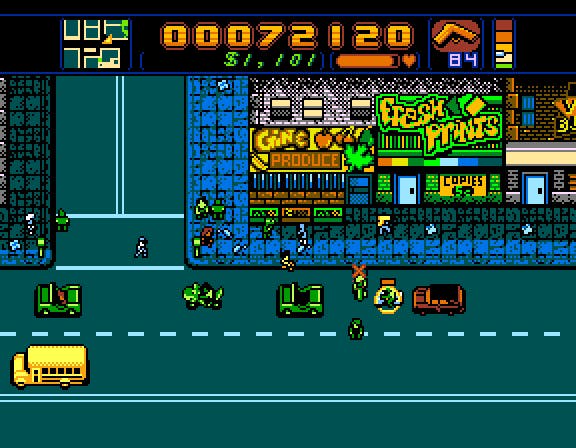
Rhodri Broadbent: I'm no analyst! The unpredictability of the indie community gives it a great deal of its appeal for me so I wouldn't like to predict, but it'd be nice if Dakko Dakko's new game inspires lots of other non-traditional side-scrolling shooters!"
Alistair Airtcheson: "Indies are well-equipped to make bold and inventive new games, and low-cost enough to explore bizarre and risky niches. As a result, the next big thing is probably going to pop out of nowhere. That said, there is one trend that I've seen growing towards the end of 2011, which I expect will continue to grow in 2012, and that's bundles. Bundles are a fantastic way to create exposure through bold and exciting events, and are built on cross-developer cooperation. Some people argue that they devalue indie games, but I don't think that's true - rapidly-dropping prices are part and parcel of the digital economy, and would happen anyway, bundles or no bundles."
Ricky Haggett, Honeyslug Games, creators of Frobisher Says (Vita):
"One new trend in '11 which is sure to continue in 2012 is Indie Game Bundles. By the end of last year, there were too many bundles for most people to keep track of, with increasingly sophisticated models and PR stunts helping them vie for attention. It remains to be seen whether bundles will ultimately be a force for good, growing the market for indie games, or whether they drive down the perceived value. But in the short term they appear to be working well for the developers involved with them."
Mike Bithell: "I'd really like to see more indie-spirited social games. There are a few out there, but it's a platform crying out for some crazed lunatic with a laptop and a retention mechanic."
Paul Taylor: "Ian (our Lead Designer) told me that he thinks there are going to be a lot of roguelikes around this year, so that could be interesting! Also, I think procedural content generation is still a pretty big trend that hasn't been fully played out yet, so you might see quite a bit more of that."
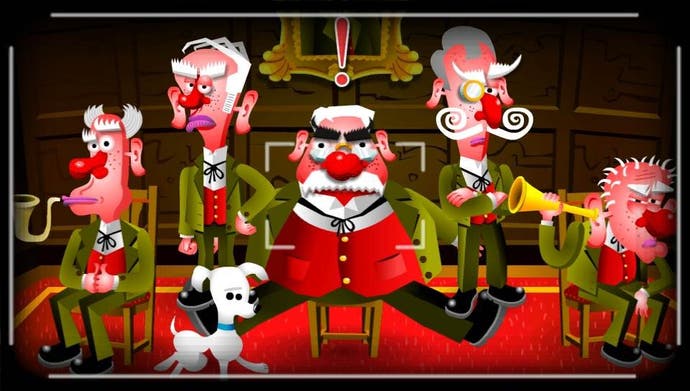
What would you like to see indie games achieve in the next year?
Rob Fearon: "I'd like to see indie games lead the charge in accessibility. I'd like to see more switch games, more moddable, editable games, more considerate games that understand not everyone's a f***ing ninja with lightning reflexes, more tuneable games, more stuff that means Special Effect's work and those like them don't entail having to scrape around for games or that they don't have to work super extra hard to make the games playable by humans.
"It's easier for us to go there, we can build with this in mind and we can show the big boys how this stuff is done. Whilst the AAA space puts in more bulls**t roadblocks we can keep stripping them out. I'd like indie games to help us get to the point where this is default for most stuff and unquestioned. That's not to want to wipe out über-hardcore experiences, natch. They have a place and that is a good thing, but in games that folks want everyone to play? Make sure everyone can play them."
Rhodri Broadbent: "I'd like the indie community at large to have a more collective voice and stronger influence over the digital stores. Indie developers make up a significant portion of the best-received and highest-rated games on the main games platform holders' digital stores, so it would be nice for us to actively influence how these stores evolve. If you're selling exclusively via those stores, then they are your sole lifeline and what might seem like a small change could have huge implications."
Alistair Airtcheson: "I want to see them playing indie games in Parliament. Can you imagine how awesome it would be to watch Cameron, Clegg and Milliband playing Johann Sebastian Joust? I also want to see more notable public events. GameCity and Eurogamer Expo (thanks to the Indie Games Arcade) have been fantastic for showcasing indie talent to a wider audience.
"For the scene as a whole, they mean broader exposure to our work, and for individual developers it's an opportunity to interact with our players on a personal level. I want to see more of these, and I want to see them get bigger and more ambitious. I think we need an analogue of the IGF here in the UK too."
Andrew Smith: "I'd like to see a move away from some of the self-inflicted secularity that still prevails in some corners of the indie sector. The one that seems to say if you want to make money from a game, or make a game for any reason other than for the joy of the creation, then you're not really an indie.
"I think people that make games are almost always driven by passion for games - that should go without question. Everything else is where the real effort goes in. On the flipside, I'd hope to see some of the platform holders - make that all of them - way more active in courting the indie scene. I've met and talked with plenty of interested publishers, but the platform holders are the gatekeepers, and if they want games that truly are unique to their service and really sell their vision, they should come to us! Just look at what thatgamecompany has achieved for PS3."
Mike Bithell: "I'd like to see indie finding a role for itself in the mainstream. I genuinely believe more gamers could be converted to smaller games if we work on the channels, and take a little responsibility for communication ourselves. The Humble Bundle was an awesome experiment which turned into a heroic business model, I see no reason why the businessmen of the indie space can't come up with 10 more similarly innovative ways of putting games in the hands of players. And if they do they should get in touch. Cough."
Dan Marshall: "I'd like to see more games that move away from what's become accepted 'indie' fare - if you take a scroll down indiegames.com you'll see there's a few visual styles that have really dominated over the last couple of years. Big retro pixels have been all the rage and probably for completely reasonable cost-effective reasons, but I'd really like to see more devs really capitalising on different art styles and showing off just how differently we can do things from the big boys."
Which indie game are you most excited about playing in 2012?
Rhodri Broadbent: "Skulls of the Shogun from Haunted Temple Studios. And I've been waiting for ages. Is it out yet? "
Alistair Airtcheson: "Frobisher Says, from developer Honeyslug, which is due out on PS Vita soon. It's a selection of Simon Says-style mini-games, each one inspired by a different one of the Vita's control schemes and capabilities, from touch-screen soup-stirring, to smiling at ladies (but not at badgers!) using the camera's facial expression recognition. How can you resist? Also, Fez. Having spent a good few hours in the Fez Lounge at GameCity, and been able to chat to its creator, Phil Fish, I've been hugely impressed by its inventiveness, as well as his approaches to design and development."
Andrew Smith: "Honestly, that's a tough one. There are so many! The usual suspects like Fez and Dustforce intrigue me professionally, and Dear Esther will be getting its second play-through in the re-released version. I'm hoping to get some time with Project Zomboid, and Thomas Was Alone is going to be special - but overall Spelunky on XBLA is going to be my most played, I can tell already!"
Mike Bithell: "I'm looking forward to Fez, obviously, along with everyone else. I'm also really intrigued to see what Terry Cavanagh puts out this year, his vow to focus on iteration on his existing ideas could lead to something really special. Not a game, but Unity 3.5 is looking gorgeous, so from a selfish point of view I'm rather excited about that."
Paul Taylor: "Retro City Rampage by about a trillion, squillion miles. If it's not a huge hit then everything I believe about indie games will be proved wrong and I will fashion myself some kind of ungainly headgear to wear as penance."
Dan Marshall: "I expect everyone's pretty excited about Fez; I can't see that failing, and I can't imagine it being anything other than this year's big indie hitter, like Meat Boy or Braid managed. Beyond that, I'm really keen to get my mitts on Monaco and Gunpoint, partly because they're both thematically-similar to The Swindle, and partly because they both just look like blisteringly good fun."
Rob Fearon: "Proteus. Although that's a bit unfair because I've already played it in many of its evolutionary forms so far so I already know that it's a wonderful thing indeed but I'm excited for other people to be able to get to play it.
"There's a shell of an early beta that's done the rounds that gives a vague idea of what Proteus is, but it's become so much more than that since then and it does more than any other game I've seen to bring back a sense of wonder to videogames again.
"It's earthy, it's Music Has The Right To Have Children to Eufloria's Music For Airports, it's the antithesis of the Michael Bay/Roland Emmerich trends in AAA games where it's just scale, always scale, bigger bangs, louder bangs, bigger buildings, more buildings.
"It's a bit Wicker Man, it's a bit Ghostbox, it's mysterious, it's untouched, it's intimate, it's a tangible place and I love pretty much everything about it. It's what I never dreamt video games would be and I treasure it even more for that."
